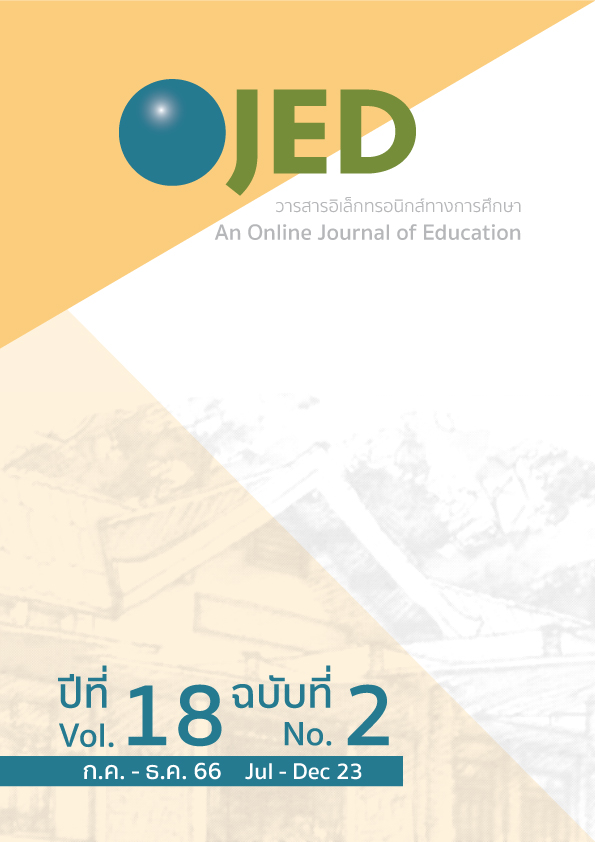The Results of Using Gamification and Growth Mindset to Develop English Reading Skills for Elementary Students
DOI:
https://doi.org/10.14456/ojed.2023.14Keywords:
English reading skills, gamification, growth mindset, primary studentAbstract
The objectives of this research were 1) to compare the reading skills of students who received learning activities using gamification concepts with a growth mindset between experimental group students and the control group; 2) to compare reading skills before and after learning activities using gamification concepts with a growth mindset of experimental. The sample group consisted of 67 elementary school fourth-grade students under the Ramkhamheang University Demonstration School Elementary Level, divided into two groups: an experimental group of 31 people and a control group of 36 people. The research tools consisted of reading ability tests and teaching plans for English reading skills by using gaming concepts with a growth mindset. The researcher compared the learning achievement between the experimental group and the control group and compared the learning achievements of the experimental group before and after learning using Mean and Standard Deviation. The research results concluded that
1) The students who managed to learn by using gamification concepts in conjunction with the growth mindset, the experimental group students had reading skills after organizing learning activities by using gamification concepts together with the growth mindset was higher than the control group students.
2) The students who managed to learn by using the concept of gamification in conjunction with the growth mindset had higher reading skills than before the experiment.
References
ภาษาไทย
กระทรวงศึกษาธิการ. (2553). หลักสูตรแกนกลางการศึกษาขั้นพื้นฐาน..พุทธศักราช 2551. กรุงเทพ: โรงพิมพ์สหกรณ์การเกษตรแห่งประเทศไทย.จำกัด.
กระทรวงศึกษาธิการ. (2562). แผนพัฒนายุทธศาสตร์การศึกษา จัดพิมพ์และเผยแพร่โดย สำนักนโยบายและยุทธศำสตร์ สำนักงานปลัดกระทรวงศึกษาธิการ กระทรวงศึกษาธิการ. Retrieved from http://www.mua.go.th/users/bpp/main/download/plan/EducationPlan12.pdf
จันทิมา เจริญผล. (2558). การพัฒนาระบบวิดีโอสตรีมมิงแบบปฏิสัมพันธ์ตามแนวคิดเกมมิฟิเคชันร่วมกับ
การเรียนแบบรอบรู้เพื่อเสริมสร้างความสามารถในการกำกับตนเองสำหรับนิสิตนักศึกษาระดับปริญญาบัณฑิต วิทยานิพนธ์ปริญญามหาบัณฑิต. สาขาเทคโนโลยีและสื่อสารการศึกษา. กรุงเทพ: จุฬาลงกรณ์มหาวิทยาลัย.
นุชนาฎ วรยศศร. (2544). ปัจจัยที่มีความสัมพันธ์กับผลสัมฤทธิ์ทางการเรียนภาษาอังกฤษของนักศึกษาสถาบันเทคโนโลยีราชมงคลพระนครใต้ วิทยานิพนธ์ กศ.ม. (การอุดมศึกษา). มหาวิทยาลัยศรีนครินทรวิโรฒ.
เมธาวี ยุทธพงษ์ธาดา. (2549). นโยบายการสอนภาษาต่างประเทศของไทยตั้งแต่สมัยสุโขทัยจนถึงปัจจุบัน. รายงานวิจัยฉบับสมบูรณ์.
รัชฏา ทับเทศ. (2554). การวิจัยและพัฒนารูปแบบการสอนอ่านภาษาอังกฤษตามแนวการสอนแบบอิงประสบการณ์ทางภาษา เพื่อพัฒนาความสามารถในการอ่านเพื่อความเข้าใจของนักเรียนชั้นประถมศึกษาปีที่ 3. กรุงเทพ: จุฬาลงกรณ์มหาวิทยาลัย.
วนิดา ดวงฤทธิ์. (2543). ผลของการใช้บทเรียนที่สร้างขึ้นตามความสนใจต่อพัฒนาการทักษะการอ่านภาษาอังกฤษของนักเรียน. มหาสารคาม: คณะมนุษยศาสตร์ และสังคมศาสตร์ มหาวิทยาลัยมหาสารคาม.
วรรณา ภูพิชญ์พงษ์. (2545). การสร้างบทอ่านภาษาอังกฤษ เทคนิคสำหรับนักศึกษา ปวส. แผนกวิชาช่างอิเล็กทรอนิกส์วิทยาลัยตรัง. สารนิพนธ์ กศ.ม. . สงขลา: มหาวิทยาลัยทักษิณ.
ศุภกร ถิรมงคลจิต. (2558). ผลของการจัดกิจกรรมการเรียนรู้วิชาวิทยาศาสตร์ตามแนวคิดเกมิฟิเคชัน เพื่อเสริมสร้างแรงจูงใจในการเรียนของนักเรียนชั้นประถมศึกษาปีที่ 2. กรุงเทพ: จุฬาลงกรณ์มหาวิทยาลัย.
สุมิตรา อังวัฒนกุล. (2549). วิธีการสอนภาษาอังกฤษ. กรุงเทพมหานคร: จุฬาลงกรณ์มหาวิทยาลัย.
อุไร จักษ์ตรีมงคล. (2561, กรกฎาคม–ธันวาคม). การพัฒนารูปแบบการสอนสถิติพื้นฐานตามแนวทางกรอบความคิดเปิดกว้างสำหรับนิสิตปริญญาตรี หลักสตูรการศึกษาบัณฑิต (กศ.บ.) มศว. วารสารการวัดผลการศึกษา, 35(98).
ภาษาอังกฤษ
Anderson, E. (2006). Growing great employees: Turning ordinary people into extraordinary
Performers. USA: Galloard.
Dweck, C. S. (2000). Self-Theories. Their Role in Motivation, Personality and Development: Psychology Press.
Dweck, C. S. (2006). Mindset: The new psychology of success. New York: Random House.
Finocchiaro, M., and Brumfit, C. (1983). Not all reading disabilities are alike. Journal of Learning Disabilities, 32, 143.
Grabe, W, and Stoller, F.L. (2002). Teaching and Researching Reading. London: Pearson
Education Longman, pp. 291.
Glover, I. (2013). Play as you learn: gamification as a technique for motivating learners.
Kai, E., (2013). The Impact of Gamification Recommending Education Scenarios. International
Journal of Emerging Technologies in Learning (iJET). Volume 8, 2013 Special Issue.
Lee, J. J., & Hammer, J. (2011). Gamification in education: What, how, why bother? Academic.
Miller, W. (1990). Reading comprehension activities kit. The United State in America: The
Center for Applied Research in Education.
Mueller, C. M., & Dweck, C. S. (1998). Praise for intelligence can undermine children's motivation and performance. Journal of Personality and Social Psychology,, 75(1), 33-52.
Simões, J., Redondo, R. & Vilas, A. (2012). A Social Gamification Framework for a K-6 Learning. In Computers in Human Behavior (Vol. 28, pp. 1-1). doi:10.1016/j.chb.2012.06.007
:10.1016/j.chb.2012.06.007 Report20
Downloads
Published
How to Cite
Issue
Section
License
Copyright (c) 2023 An Online Journal of Education

This work is licensed under a Creative Commons Attribution-NonCommercial-NoDerivatives 4.0 International License.




